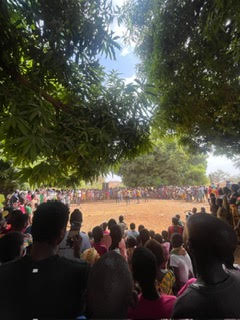Since arriving in Ghana, my classmates and I embarked on a journey filled with uncertainty and anticipation. We questioned what this experience would offer us and what we could contribute in return. Unlike typical vacations where we selectively indulge in the beauty, often turning a blind eye to the hardships, our purpose in Ghana was to embrace every facet of life it had to offer – the good, the challenging, and everything in between.
Immersing ourselves in the Ghanaian way of life has proven to be both enlightening and demanding. We witnessed the beauty of community involvement, the resilience of its people, and their unwavering dedication to religion, family, and culture. However, alongside these moments of splendor, we encountered stark realities. At the Tamale Teaching Hospital, we saw the aftermath of motor vehicle accidents, where inadequate healthcare and financial constraints left many without proper care. The hospital, rather than a place of healing, became a symbol of limited resources and unmet needs.Living conditions under scorching 40-degree heat, with limited access to air conditioning or even fans, highlighted the stark contrast to our accustomed comforts. Daily power outages became routine, reminding us of the fragility of infrastructure. The water situation, which relied on hand pumped wells and packaged water due to contamination concerns, was equally daunting and painted a vivid picture of the challenges of securing safe water for hydration.
This emphasizes the disparity from the abundant and safe water sources that are present in Canada. The physical demands of daily life, especially for women who carried burdens on their heads while travelling long distances, underscored the resilience required to navigate such challenges. Moreover, the environmental impact of uncollected litter, burned garbage releasing toxins into the air and water, further exacerbated health issues.
Yet, amidst these hardships, the Ghanaian people welcomed us with open arms, eager to share their culture and way of life. Their warmth and hospitality left an indelible mark on our hearts. This experience served as a poignant reminder of the privilege we often take for granted. It underscored the value of community, family, and finding meaning beyond material possessions. Ghana has taught me patience, resilience, and the importance of embracing different ways of life. It shattered my preconceptions and expanded my worldview. This journey, with its highs and lows, has been nothing short of transformative. It has left me with a profound appreciation for the richness of human experience and the resilience of the human spirit.
Posted by Mackenzie, 4th year BSN Student























.jpeg)
.jpeg)






